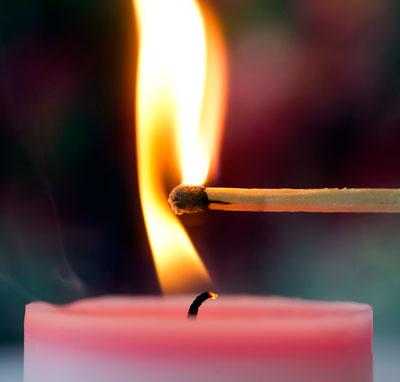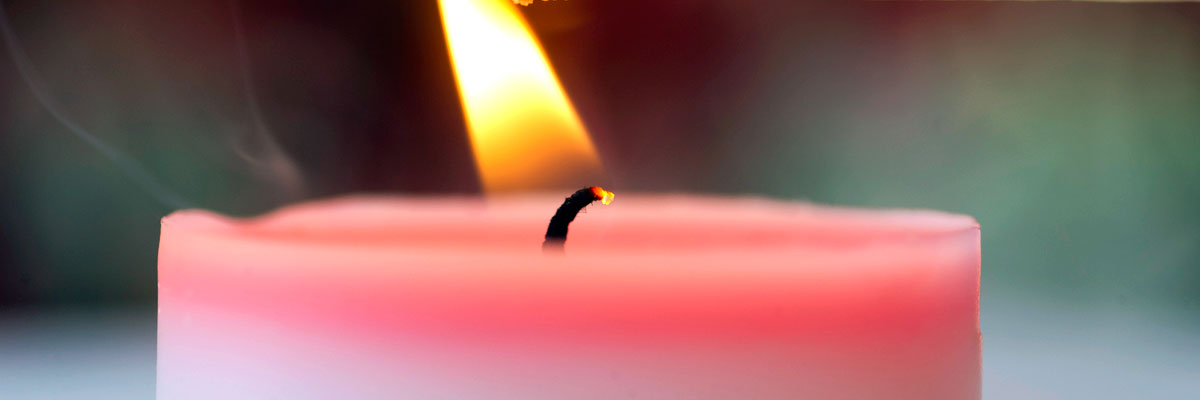Official Website of the
Catholic Diocese of Little Rock
Share joy and hope on Gaudete Sunday
Published: December 14, 2025
"Brothers and sisters: Rejoice in the Lord always. I shall say it again: rejoice! Your kindness should be known to all. The Lord is near. Have no anxiety at all, but in everything, by prayer and petition, with thanksgiving, make your requests known to God. Then the peace of God that surpasses all understanding will guard your hearts and minds in Christ Jesus." — Philippians 4:4-7
These words begin the second reading on the Third Sunday of Advent, which is called Gaudete Sunday. "Gaudete" (pronounced gow-deh-tay) is Latin for "rejoice," which refers to the first word of the entrance antiphon. “Rejoice in the Lord always; again I say, rejoice! Indeed, the Lord is near.” (paraphrase, Philippians 4:4-5).
The word "advent" originates from the Latin "adventus" which means coming. As the four weeks of Advent progress, so does the anticipation. On Gaudete Sunday, the celebrant wears rose vestments to signify joy, that the waiting is half over and Christmas is near. Gaudete Sunday’s counterpart in Lent is Laetare Sunday, another break in penance to rejoice in hope as we approach Easter. During both days, the celebrant wears rose vestments.
 Violet is the official color of Advent, because this season, like Lent, has a penitential tone because it is a time to be absolved of sin and be in the state of grace for Christmas, but "Gaudete Sunday offers a brief respite to focus on the uplifting, upcoming joyful celebration of the nativity," explained Father Michael Van Sloun in the Catholic Spirit.
Violet is the official color of Advent, because this season, like Lent, has a penitential tone because it is a time to be absolved of sin and be in the state of grace for Christmas, but "Gaudete Sunday offers a brief respite to focus on the uplifting, upcoming joyful celebration of the nativity," explained Father Michael Van Sloun in the Catholic Spirit.
If you haven't received the sacrament of reconciliation in a while, we invite you to make time for yourself to reconcile with God at a parish near you. We offer confession times statewide. Visit this list to find a time that works for you.
Gaudete Sunday reminds us there are many reasons to be joyful. "There is joy in looking forward to the annual celebration of Christmas, but there is also joy in recalling the birth of Jesus on the first Christmas. The joy is heightened because he was born to save us from our sins (Matthew 1:21). The joy also extends to anticipation of the second coming, either at the end of physical life or the end of the world, the time when believers will be given the crown of righteousness (2 Timothy 4:8) and a place in the Father’s house (John 14:2) to dwell with God and his angels and saints for all eternity."
In the video below, Bishop Robert Barron focused his 2022 Gaudete Sunday homily on the command to rejoice always, especially when that is the last thing you feel like doing. The peace we all long for comes from being grounded in our faith, not the ups and downs of life. "Living in Christ, that's where you find joy," he said.
Highlighting the Sunday's second reading from Philippians 4:4-7, Bishop Anthony B. Taylor explained how the Our Father can help free us from our anxieties to focus on joy.
"Every time we pray the Lord's Prayer, after praising God and his kingdom in the first half of the prayer, we then ask him in the second half to free us from all our fears," he said during his 2024 Gaudete Sunday homily.
"I respond to your words in the Lord's Prayer with a prayer that reminds us of the hope represented by the pink candle that shines brightly today: 'Deliver us, Lord, from every evil and grant us peace in our day. In your mercy keep us free from sin and protect us from all anxiety as we wait in joyful hope for the coming of our Savior, Jesus Christ,'" the bishop said.
"So, what are you afraid of? It can't be anything greater than the power that God gives us to confront our fears and overcome them," he concluded.
During the Alleluia at this Mass, we hear an abbreviated version of this Scripture: "The spirit of the Lord God is upon me, because the Lord has anointed me; he has sent me to bring glad tidings to the poor, to heal the brokenhearted, to proclaim liberty to the captives, release to the prisoners, to announce a year of favor from the Lord and a day of vindication by our God; to comfort all who mourn; ..." (Isaiah 61:1-2)
In the video below, Father Jason Sharbaugh reminded us in 2020 that one of the main ways to find joy and hope is to bring them to others; to bring Christ to the brokenhearted, the lonely, the poor, those held captive by fear or loss.
He suggested finding some "way of connectivity through a card, an email, a text or sending a gift; something they can have in their hand to let them know they are being thought about or being prayed for."
If you are struggling this year, consider attending a Blue Mass. This special Mass of remembrance is for anyone who has lost a loved one because of death or separation of any kind. All those who find the holidays deeply painful or lonely are welcome to attend. Traditionally, Our Lady of the Holy Souls Church in Little Rock offers this Mass. Please contact the parish for details.




